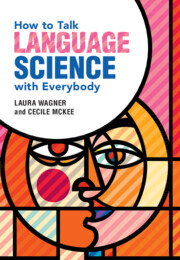Book contents
- How to Talk Language Science with Everybody
- How to Talk Language Science with Everybody
- Copyright page
- Contents
- Figures
- Preface
- Acknowledgments
- 1 Why Bother?
- 2 You Can Be the Expert
- 3 Cooperative Conversations
- 4 Conversational Goals
- 5 Know Your Audience
- 6 Creating Relevance by Generating Interest
- 7 Creating Relevance by Making Connections
- 8 Quality and Credibility
- 9 Quality vs Quantity
- 10 Learn to Listen
- 11 Information Structure
- 12 The Curse of Knowledge
- 13 Start with Examples
- 14 What’s New?
- 15 From Given to New
- 16 The Three-Legged Stool Approach
- 17 Working with a Range of Different Audiences
- 18 Where Can I Go?
- 19 Being a Good Partner
- 20 Finale
- Appendix Teaching with This Book
- References
- Index
17 - Working with a Range of Different Audiences
Published online by Cambridge University Press: 17 May 2023
- How to Talk Language Science with Everybody
- How to Talk Language Science with Everybody
- Copyright page
- Contents
- Figures
- Preface
- Acknowledgments
- 1 Why Bother?
- 2 You Can Be the Expert
- 3 Cooperative Conversations
- 4 Conversational Goals
- 5 Know Your Audience
- 6 Creating Relevance by Generating Interest
- 7 Creating Relevance by Making Connections
- 8 Quality and Credibility
- 9 Quality vs Quantity
- 10 Learn to Listen
- 11 Information Structure
- 12 The Curse of Knowledge
- 13 Start with Examples
- 14 What’s New?
- 15 From Given to New
- 16 The Three-Legged Stool Approach
- 17 Working with a Range of Different Audiences
- 18 Where Can I Go?
- 19 Being a Good Partner
- 20 Finale
- Appendix Teaching with This Book
- References
- Index
Summary
Emphasizing preparing for a range of different audiences, Chapter 17 opens by asking readers to think about who might respond particularly well to the demonstrations that they are developing. The chapter contrasts audiences in informal learning settings and elsewhere. For the former, it’s important to have a pitch that is friendly and enthusiastic, and to be clear that your activities are free for everyone. Strategies for increased inclusivity are suggested. Summarizing some guiding principles, the chapter returns to the strands of science learning in the context of knowing your goals; considering how given and new vary across people, and planning ahead are also emphasized. Concerning applied audiences such as teachers or lawyers or policy makers and academic audiences, the principle that incomplete is not incorrect is again stressed. With all kinds of audiences, practice is paramount. The Worked Example uses a demonstration with George Bernard Shaw’s "ghoti" spelling, adjusting the spin for several different audiences.
Keywords
- Type
- Chapter
- Information
- How to Talk Language Science with Everybody , pp. 203 - 214Publisher: Cambridge University PressPrint publication year: 2023

